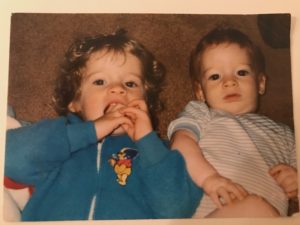
When my older son arrived from college for a rare weekend visit home this summer, one of his first questions was, “So, Mom, are you still writing at four or five in the morning?”
“Yes,” I said, “still beating the sun out of bed most days.”
My son turned to his girlfriend who had come home with him. “She always did that. She was trying to get away from us kids and the pets.”
I was struck by the half-joking tone–the childish claim to all of mom–when he said it. (And, in my defense, I never did get away from the pets.) I considered at that moment all the dark early mornings I got up and sneaked past my sleeping children’s rooms to the opposite end of the house where I sat at my desk and poured a cup of coffee from the thermos I’d put there the night before. In those early hours, I wrote as if my life depended on it.
It was lonely as well as life-giving. My warm bear of a husband remained in bed. One year, my older son slept while I wrote a detective novel. Eighteen months later, my second son snuffled his way through the night, joining his father and brother in the land of nod while I wrote a literary thriller. Even the pets went back to sleep.
I wrote quietly by hand on a yellow pad and kept the music low. I might start my routine with some ethereal Van Morrison, but, if I really got cooking, I’d rock out with Social Distortion’s punk version of “Ring of Fire.” I checked the baby monitor on my desk frequently, half hoping for a murmur, half dreading it. Because I wasn’t technologically savvy enough–or awake enough–to be absolutely sure the baby monitor wouldn’t morph into a two-way radio, I’d turn Social D down or steal precious moments to hunt for the headphones.
The goal was two pages a day. If I did that every day, I reasoned, I’d have a novel by the end of the year–even if I flaked on a few days. Occasionally, I met my goal before a sleepy boy with his “bankie” and “tacifier” appeared in the doorway, making a beeline for my lap–the sonar of the young child having pinged off the moving mother. When I hadn’t made it to two pages, I’d scribble a note about my next thought and breathe out my frustration.
With my son in my lap, I put the pen down and the computer to sleep, rocked him in my desk chair, leaning back into the spring of it. I smelled his baby head and remembered for just a moment the little boy I’d written into my story, fact-checking to see if this is the way little boys look, sound, feel, move. Yes and yes and yes.
I had already learned by then not to have a to-do list from that moment forward into the day. It was an adjustment that served me well when the second son came so soon after the first. What a joke was the advice to do work when the baby napped or went down for the night! When he napped–IF he napped–more often than not, the kitchen needed excavation. By the time I plowed through the kitchen chores to get to my study on the other side, a plaintive cry came from the nursery. It grew to the roar of an outraged baby: “What do mean you need to write a word? What about the word HUNGER?”
So I got up even earlier than my kids could conceivably rise. I got up at four or five in the morning to meet my muse.
Because I couldn’t not write. It was that simple. Like the urge to push in labor, like, later on, my sons’ urge to grow up and be on their own. My urge to write was a need, a craving, a requirement. If that meant rising pre-dawn, then so be it.
My desk beckons to me even now, well beyond my sons’ growing up, beyond the sweaty restlessness of menopause, beyond my teaching career and into the administrative one. And still at four or five. It is as compelling, as imperative now as it was then: the call in the dark of the character who wants to speak or the essay that needs life. A call as ineluctable as any of my babies’.
As I looked at my grown son that summer night, the lament of the negligent mother echoing in my head, many responses came to mind. “I did my best!” Then I considered bursting through the injustice of the accusation with an “Unfair!” Or “You have gone on to your own life, to your lovely girlfriend and your fine tribe. You have left me too!”
But I didn’t say any of these things. Instead, I thought of how I carried him with me into my study–even when it was only in my imagination, while he was still sleeping in his crib. How, after he was born, I couldn’t write a novel or an essay that didn’t have a little boy in it. He was that much part of me.
It pained me that he had gone away, probably never to live again in my home, with a wrench so familiar it was almost unnoticed. That night at the train station I understood, standing beside my tall son, that we both had surrendered to the call of our personal passions, leaving the other behind. He had put distance between us; I had put the night. But, in the same moment, I could also see that he carries me with him as well, in his love of learning and music, his wry humor, his loyalty. I looked at the sparkle in his eye, his easy stance next to me, and knew how much we share. And I knew, too, that the act of being carried away itself–even that, ironically enough–connects us.

What a beautiful post. It brought tears to my eyes. My children are still young (12 and 5) but this feeling and this doubt that sometimes come to our mind – this “am I being the mother he/she needs” is a common feeling, no matter where you live in this world or how old your children are. We want to be the best possible mother for them. I often think that the most important job as a mother is to prepare my kids for the path, teaching them that they have everything they need to deal with anything that comes their way. Reading your post makes me hopeful that some of the things that will help them are things that will remind them of me because, as you say, we carry them in us and they also carry us in them – and this bond is unbreakable.
Hi, Cecelia, thank you so much for your lovely appreciation. I agree completely–it is so hard to mother and honor our own needs at the same time! I can report from even later than when that piece was first written that not only have my children done well for themselves, they still care about me so much that we have all chosen to live within a block of each other!